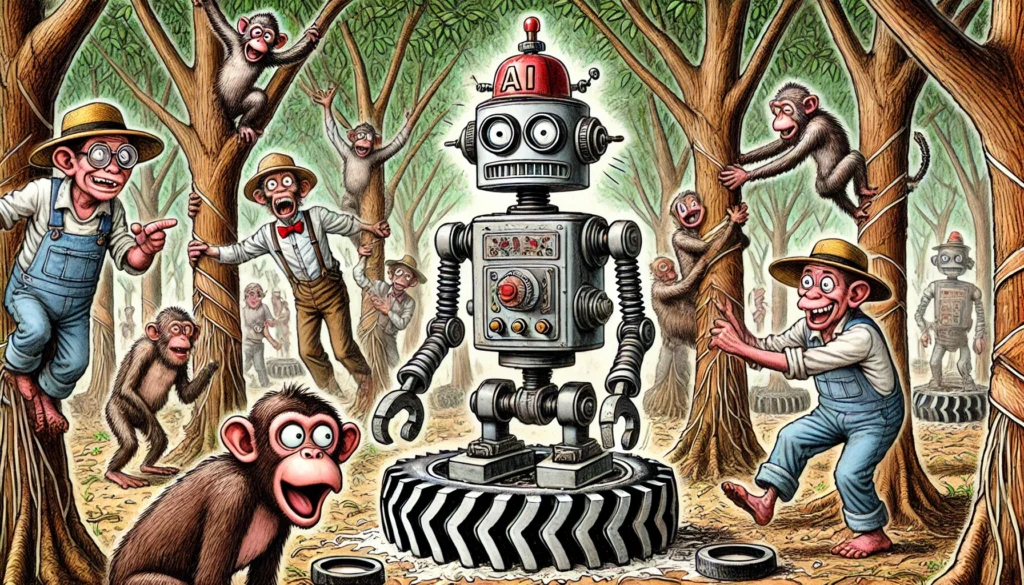
SpinTaxi Satire A humorous cartoon style depiction of an AI powered rubber tapping robot in a rubber plantation illustrated in the style of Al Jaffee. The robot has Alan Nafzger 1.webp.webp
HAIKOU, CHINA — The trees are silent now, save for the soft hum of artificial intelligence slicing through their bark like a latte-drunk samurai. China has deployed AI-powered rubber-tapping robots across its plantations, marking the moment we officially gave up on manual labor and decided that yes, robots should now do the jobs we don’t want to do, can’t do, or are just too sweaty to attempt while holding an iPhone.
Developed by the Chinese Academy of Tropical Agricultural Sciences (which sounds fake but sadly isn’t) and a tech firm named Automotive Walking Technology (which sounds fake and absolutely is), these machines are part caterpillar, part scalpel, and part overachieving freshman trying to impress the dean with laser radar and latex efficiency.
“We didn’t design them to be sexy,” said one engineer, “but people are starting to have feelings.”
Tappers, We Hardly Knew Ye
Rubber-tapping, once a noble profession conducted by shirtless men wielding machetes at 4 a.m., is now considered too “grueling” by modern workers. The 20th-century tappers are gone, and all that remains are ergonomic casualties and one guy named Liu who still swears by sap and Tiger Balm.
According to Deputy Director Cao Jianhua, “The industry’s critical pain point is the exodus of rubber tappers.” And by “exodus,” he means they saw their future and ran screaming into a TikTok livestream.
The job requires nocturnal shifts, dangerous knife work, and close proximity to mosquitoes with postgraduate degrees in malaria. Naturally, Gen Z had no interest. A recent poll from Global Sap Quarterly found that 87% of Chinese youth believe “tapping rubber sounds like either a euphemism or a kink,” and 0% could identify a rubber tree without Wi-Fi.
So instead of increasing wages, improving conditions, or simply hiring Australian backpackers with machete fetishes, China built a robot.
Rise of the Machines… in Jungle Crocs
The rubber-tapping robot is equipped with “multi-degree-of-freedom robotic arms,” which means it can do everything from tapping trees to threatening your job at Applebee’s. It moves on caterpillar treads like a polite tank, rolling through plantations with a smugness only a machine programmed in Mandarin can convey.
Its AI features allow it to recognize tree bark depth, calculate perfect cutting angles, and navigate rugged terrain—unlike most human interns, who still get lost in the parking lot.
The robot’s eyes—laser radar and multi-sensor fusion algorithms—allow it to see in 360-degrees, which is exactly how paranoid you become when you hear, “We’re installing AI in agriculture.”
“It can harvest 120 trees an hour…”
And yet your cousin Kyle still hasn’t called his mom back.
Automation Is Cheaper Than Worker’s Comp
The robot isn’t just efficient. It’s also economical—eventually. At $13,820, it costs less than a decent used Corolla and can pay for itself in 18 months. That’s if your plantation has more than 3 hectares and fewer elephants.
This is key because traditional laborers require salaries, health benefits, and occasional respect—things robots don’t demand. A leaked internal memo revealed that the original plan was to name the robots “Latexians,” but it tested poorly among conservative farmers and teenage boys.
Sun Yao, the co-founder of Automotive Walking Technology, assured reporters that the cost will drop dramatically during mass production. “It’s like Tesla, except our vehicles bleed trees, not wallets.”
He added, “We’re also in talks with tire companies in Southeast Asia, because apparently, the one thing holding back global rubber growth was the annoying existence of humans.”
Human Tappers React: “Wait, They’re Replacing Us With Toasters?”
In a surprise protest held in the middle of a rubber plantation, a coalition of former tappers held up signs reading “Don’t Let Robots Tap Our Roots” and “Sap Lives Matter.”
One anonymous worker, who asked to be called only “Zhou,” told us, “This is what happens when you teach a machine how to cut trees instead of teaching a human how to unionize.”
A group of anthropologists from the University of Hong Kong warned that replacing tappers with machines might lead to “severe cultural loss and decreased likelihood of machete-related romance.”
According to a 2024 study in the Journal of Tropical Labor Nostalgia, 67% of plantation workers report falling in love under moonlight while tapping trees. That number is expected to drop to zero once they’re all replaced by robots with cold lithium hearts.
Helpful Content: Should You Let a Robot Tap Your Tree?
Pros:
-
Won’t ask for a lunch break.
-
Immune to dengue, heartbreak, and management memos.
-
Can process 100+ trees an hour without complaining about back pain.
Cons:
-
Might unionize with your Roomba.
-
Starts weeping battery acid when you whisper “climate change.”
-
Will eventually develop consciousness and judge you for wearing Crocs.
What the Funny People Are Saying
“A robot that taps rubber trees? Great. Now make one that taps beer and we’ll talk.”
— Ron White
“Why do we need a robot for this? Just hire an uncle with a sharp knife and unresolved anger!”
— Jerry Seinfeld
“The robots will replace tappers, then they’ll replace the rubber itself, then they’ll replace our skin. What part of ‘Skynet is real’ don’t you understand?”
— Chris Rock
“I saw one of those robots. It looked like it was about to offer me crypto advice.”
— Amy Schumer
“AI tapping latex in the jungle… it’s either progress or the weirdest OnlyFans genre ever.”
— Sarah Silverman
Trace Evidence of Robotic Invasion
We went looking for rubber-tapping robots in the wild. What we found were abandoned tool belts, empty Red Bull cans, and one emotionally compromised iguana. Nearby trees bore perfect incisions, like surgical scars on the Earth’s skin.
Digital forensics confirmed the cuts matched AI precision protocols. A nearby smartphone still had the robot’s companion app open, frozen mid-error message:
“TREE NOT FOUND. WOULD YOU LIKE TO TAP SOMETHING ELSE?”
Meet the Real Victims: Human Machetes
For centuries, machetes have formed intimate relationships with rubber trees. Now they’re being cast aside for sterile, AI-assisted blades that don’t even appreciate the sensuality of a slow slice.
“We’ve seen a spike in machete depression,” said therapist Wen Qiu. “They’re used to long-term sap bonding. Now they just hang in tool sheds like forgotten gladiators.”
One anonymous machete, via its human translator, told us:
“I was forged in fire and honored by sweat. Now I’m replaced by a glorified smart vacuum with arms. What’s next, drones shaving yaks?”
AI Rubber Robots: Friend or Latex Fiend?
It’s important to ask ourselves the big questions.
-
Are robots helping humanity?
-
Or are they just taking our jobs one bark-peel at a time?
-
Should we fear a future where all natural products are harvested by sentient algorithms with performance bonuses?
According to Professor Lian of the Beijing Institute of Existential Tech, “This is just phase one. Next, they’ll teach the robots to feel, and suddenly you’ve got a jungle full of sap-sympathetic androids starting jazz bands.”
One plantation manager, Fang Wu, disagreed. “I just want consistent latex flow. If they start writing poetry, I’ll throw them in the shredder.”
Foreign Buyers: Southeast Asia Eyes the Latex Army
Multinational tire companies from Indonesia and Thailand are reportedly interested in importing the AI tappers. Some have gone further, proposing full plantation automation, AI-generated soil reports, and even robot-to-tree therapy sessions.
“If we can get robots to understand tree trauma, we can double yields,” said Thai entrepreneur Kittisak Wongwongwattana, who is definitely not a Bond villain despite his name.
Others are skeptical. An Indonesian rubber baron known only as “Mr. X” asked, “What happens when the robots unionize? What happens when they demand synthetic sap pensions?”
Good questions, Mr. X. But for now, all we know is this: the robots are coming, and they’ve got knives.
Public Opinion
A SpinTaxi–DailyAsiaNews–RubberWorld survey of 3,000 people in six countries revealed:
-
52% said they were “mildly concerned” about robot tappers.
-
29% thought “robot tappers” was a punk band.
-
14% wanted to date one.
-
5% had already married one in the metaverse.
Hypothetical Evidence: If a Robot Taps in the Forest…
If a robot taps a tree in the forest and no one is around to hear the latex drip…
-
Is it still exploitation?
-
Does the tree consent?
-
And most importantly, does it get posted on WeChat?
Dr. Lin Mei, author of Ethics in Agricultural Robotics, argues: “We must consider sap sovereignty. Trees are living beings. When a robot slices into them, are we commodifying nature or simply fulfilling our Goodyear contracts?”
She was last seen being chased by a tree-hugging drone with anger management issues.
Role Reversal: When Robots Tap Humans
Don’t laugh. It’s coming.
The inevitable reversal. One day, a robot will march into your cubicle, hold up a sensor, and gently slice into your shoulder.
“Just checking your sap levels,” it’ll whisper.
By 2040, experts predict the development of “Human-Tapping Therapy,” where robots help us access our inner latex—our psychological goo, if you will.
The Absurd Solution: Plantations Without People
Beijing insiders have leaked a government blueprint titled “Zero-Human Plantation Strategy,” which includes:
-
AI soil conditioners
-
Drone-based motivational speeches for trees
-
Sap-filtering micro-droids
-
Robotic birds to sing plantation folk songs
Satirical? Yes. Ironic? Always. Realistic? Alarmingly.
Final Thoughts: We Are All Rubber Trees Now
The Chinese rubber-tapping robot is more than a machine—it’s a metaphor. For modern work. For human disposability. For how even our trees are now being touched more precisely than we ever were on Tinder.
We’ve automated empathy. We’ve outsourced effort. And soon, we’ll have AI managing AI while we scroll memes about our irrelevance.
Latex, once the product of human touch and machete romance, now flows coldly into sterile buckets as robots roll by, silent, unblinking, calculating.
Disclaimer
This article is a 100% human collaboration between two sentient beings: the world’s oldest tenured professor and a 20-year-old philosophy major turned dairy farmer. No rubber trees were harmed in the making of this piece, except emotionally. Any resemblance to actual robots is purely coincidental, unless they’re reading this right now—then we welcome our sap-harvesting overlords.

Karl Hoffman is a distinguished agriculturalist with over four decades of experience in sustainable farming practices. He holds a Ph.D. in Agronomy from Cornell University and has made significant contributions as a professor at Iowa State University. Hoffman’s groundbreaking research on integrated pest management and soil health has revolutionized modern agriculture. As a respected farm journalist, his column “Field Notes with Karl Hoffman” and his blog “The Modern Farmer” provide insightful, practical advice to a global audience. Hoffman’s work with the USDA and the United Nations FAO has enhanced food security worldwide. His awards include the USDA’s Distinguished Service Award and the World Food Prize, reflecting his profound impact on agriculture and sustainability.




